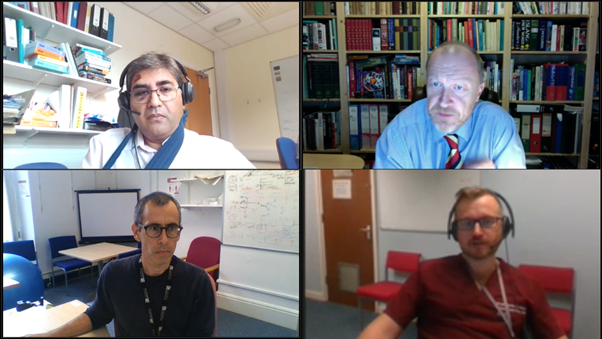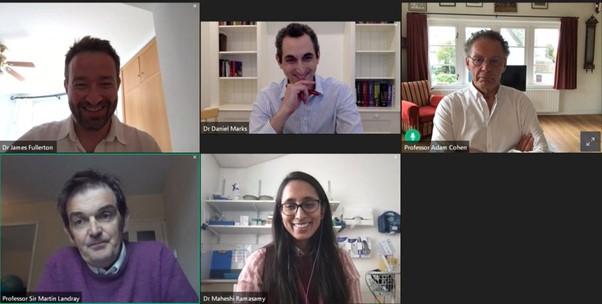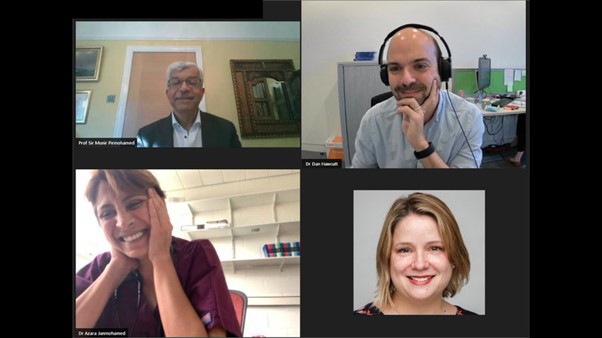Published: 21 Oct 2021
Category:
Clinical Pharmacology Week this year took place from 10-16 October. As part of our #BPSLIVE webinar initiative, we hosted a series of webinars showcasing the many ways in which this small but growing specialty is making a big impact. Not only has clinical pharmacology proved crucial to recovery from the COVID-19 pandemic (as shown in the RECOVERY Trial for example), but there is a multiplicity of other ways it improves outcomes for patients. Our series of clinical pharmacology-focused webinars featured just some of these ways.
The first of the webinars explored safe prescribing. This is a topic very close to the Society’s heart and an area that we work on frequently, especially with regard to the Prescribing Safety Assessment (PSA), a joint initiative run with the Medical Schools Council.
This session was chaired by Professor Simon Maxwell, Medical Director of the PSA. The session covered crucial areas including a talk on polypharmacy given by Dr Rupert Payne at the University of Bristol, an exploration of pharmacovigilance from Professor Jamie Coleman from the University of Birmingham, and Professor Fraz Mir, University of Cambridge, who discussed interpreting evidence and its application to practical prescribing.
Some important questions came to light during the Q&A session, including one about the role of hospital doctors in prescribing. Responses involved the importance of consultants thinking beyond their own specialties, making careful decisions about starting as well as stopping medicines, and ensuring good cross-team patient communication.

Top left to right – Professor Fraz Mir, Professor Simon Maxwell. Bottom left to right – Dr Rupert Payne, Professor Jamie Coleman.
Our second webinar focused on innovation in clinical trials – delivering studies that are agile and informative. It was chaired by Dr Daniel Marks of University College London Hospitals NHS Foundation Trust and AstraZeneca, and Dr James Fullerton from the University of Oxford. This topic was especially timely considering the pivotal role agile clinical trial design has played in developing vaccines and treatments for COVID-19.
Our first talk was a riveting exploration of smarter trials for better health, given by Professor Sir Martin Landray, a clinical pharmacologist based at the University of Oxford, who is also co-lead-investigator of the RECOVERY Trial – the world's largest trial of potential treatments for patients hospitalised with COVID-19. Professor Landray emphasised the importance of clinical trials and ended on the resounding note that randomised trials are an essential component of high-quality clinical care.
Dr Maheshi Ramasamy, a principal investigator at the Oxford Vaccine Group, gave the second talk and took the audience through the journey the Oxford and AstraZeneca teams went on in developing a global vaccine against COVID-19. Dr Ramasamy reminded the audience that while we have made great strides in our vaccine effort and uptake in the UK, there are still many places around the world that require these much-needed vaccines.
Our final talk was from Professor Adam Cohen from the University of Leiden, where he discussed how we can begin to reduce the bureaucracy surrounding clinical trials. In his talk, Professor Cohen highlighted a recent commentary in the British Journal of Clinical Pharmacology, which investigated some of the issues with current clinical practice guidelines.
There were many interesting points raised in the Q&A session and it was clear that many audience members felt passionately about ensuring robust and reliable clinical trials remain a priority.

Top left to right – Dr James Fullerton, Dr Daniel Marks, Professor Adam Cohen. Bottom left to right – Professor Sir Martin Landray, Dr Maheshi Ramasamy.
The final webinar focused on pharmacogenomics and its implementation in the NHS. The session was chaired by Society President, Professor Sir Munir Pirmohamed, a clinical pharmacologist at the University of Liverpool. This session was an excellent overview of the current state of pharmacogenomics in adult and child health, but also where there are gaps in the education and training sphere. This skills gap is the focus of a joint working party between the Society and the Royal College of Physicians. We will share more details on this project as it progresses.
During this final webinar, Dr Azara Janmohamed from St Georges University Hospital spoke about pharmacogenomics in adult health, highlighting the important role that clinical pharmacology plays in pharmacogenomics. This is an area we have also outlined in our 2021 spending review submission to the Chancellor of the Exchequer.
We then heard from Dr Daniel Hawcutt from the University of Liverpool, who spoke about the use of pharmacogenomics in paediatrics – an area which is often overlooked. Dr Hawcutt explicitly highlighted the importance of forming international consortia to generate robust evidence.
Our final talk was from Dr Michelle Bishop from Health Education England, who emphasised the vital work of clinical pharmacologists in the pharmacogenomics arena. Dr Bishop explained that pharmacogenomics education and training needs are not confined to just one specialism or one profession, and that we need to keep a broad view of whose work will involve pharmacogenomics and what they need to understand to integrate it into their work.
The Q&A involved a fascinating discussion about how we can improve the amount and quality of pharmacogenomic data across diverse ethnic populations, and how community outreach could help recruit more diverse populations of participants for trials.

Top left to right – Professor Sir Munir Pirmohamed, Dr Dan Hawcutt. Bottom left to right – Dr Azara Janmohamed, Dr Michelle Bishop.
To discover more about clinical pharmacology, visit our careers pages or follow the hashtag #ClinPharmWeek on twitter.
Comments
If you are a British Pharmacological Society member, please
sign in to post comments.